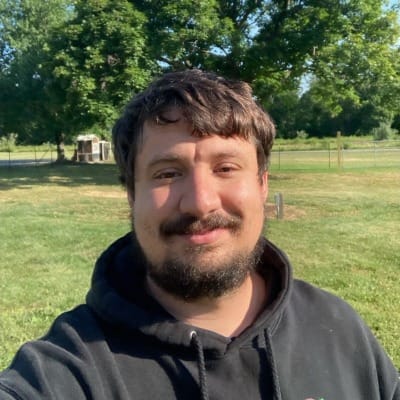Engineering Leadership Series - Zach Fry


Intro words - Today we have another insightful guest joining us in the Engineering Leadership Interview Series. Zach Fry, the Vice President of Engineer at Arthur joins us to discuss his path and how from a young age, he always had an affinity for software and hardware. Zach shares insights into his philosophy on leadership as well as how he wants to impact the world.
Zach holds dual degrees in Computer Science and Electrical, Computer, and Systems Engineering. Zach is a very passionate engineering leader who has experience working with MIT Lincoln Laboratory, GlobalSpec, almost years with Palantir, and most recently Arthur.
Arthur is the industry-leading AI agents platform that simplifies deployment, monitoring, and management of traditional and generative AI models.
Enjoy the interview and give Zach a follow.
More Information
https://www.linkedin.com/in/fryware/
https://www.arthur.ai/
The Interview
DoneStreet
How did you get to where you are? How did you Discover your love of software engineering?
Zach
In my life, I have been very blessed from a very early age. Unlike a lot of peers and people in our generation, I knew exactly what I wanted to do and I'm pretty good at it. And luckily, it is a job that allows me to make a pretty decent amount of money. From a very young age, I knew I wanted to be working with computers.
My dad was an educator, a principal for various schools. He himself was a champion within those districts for administering technology and the advancement of technology. He took community college classes and he got a master's degree and a PhD and a big part of what he learned in these programs was how education could be advanced with technology. And so from a very young age I was exposed to computers. We had old school dial up when I was growing up. I had access to the Internet before a lot of kids my age had access to the Internet and computers. He was very big into buying software and teaching us how to type and how to use computers.
In elementary school and middle school I was buying books or getting books at the library that were things like Linux administration guides, and how to do programming and build applications. I wanted to build games and tools. I was a big fan of building out programs from my TI83 calculator. It had lots of different games. We'd share them out with each other. And so from a very early age, I knew that this is what I wanted to be doing.
Then I went to school at Rensselaer Polytechnic Institute (RPI) in upstate New York. There were two major factors in my decision to go to RPI. Primarily it was far away from my parents. I wanted to do my own thing. I wanted to be as far away and kind of stand on my own two feet. At the time, my parents were in Denver. The second thing was I didn't want to deal with any of the fluff of the humanities, the classical liberal arts. I wanted to do like engineering as much as possible. So I studied computer science and computer systems engineering.
I got a dual degree, which was a cool program because it gave me an opportunity to get both the computer science, which is a little bit more of theoretical foundations of computing and sort of theory behind it, as well as the very practical engineering. I got exposure from microprocessor design, circuits and electronics all the way up through programming theory and programming language theory and database theory. It was a really cool program. I learned a lot at that university. I interned for two years in a row at MIT Lincoln Labs, which is a federally funded research and development center. It’s a cool program that sparked my interest in the entrepreneurial spirit.
It's cool because the mission of Lincoln Labs. It was founded, back in World War II days when radar was being developed by the allied nations. The invention of radar contributed enormously to us winning the war. And at the time, it was like well, we've got this microprocessor and these systems that take a scan and analyze the signal. That helps us get information and intelligence about what we need to do to be more effective, more lethal. But we need to develop this technology and we need to get it into the hands of people that can use it. And so the mandate of the lab, as I came to understand it, is that they basically prototype out technology to identify and decide which of these things has merit to push towards more of the larger defense contractors and the leaders in the industry.
It was a very cool place where all of the stuff that they were working on was like a research project with an idea for how is this going to be commercialized and how is this going to be then leveraged and utilized by the Department of Defense to safeguard our society. So I got a blend of this is a really compelling mission in terms of the impact it has on society and the broader United States with the Department of Defense. And I also got a little bit of that entrepreneurial spirit.
DoneStreet
And after graduating, how did you decide what to do?
Zach
When I was getting ready to graduate my senior year, I was thinking about my next job opportunities. I had a bunch of different opportunities lined up with Amazon, Google, Red Hat and with MIT Lincoln Labs. A company that I wasn't even really tracking at the time reached out and recruited me. So I went through the process with Palantir.
One of the things that I was thinking about at this stage was I really enjoy the collaborative exercise. I'm a very collaborative person by nature. I enjoy solving problems. And there was just something that wasn't necessarily super appealing to me about sitting in front of a computer all day and writing code and being sort of detached from the business outcomes? Like, how are the people actually using the software? What are the problems that they're actually solving? And it was something that I was like, yeah, well maybe that's just kind of like the nature of the beast. I studied computers and I'm going to be a computer programmer. That's where all the money is. That's where all my peers are going, and it's what everybody's doing.
What was cool with Palantir at the time was that they reached out about a role and they said, “Well actually, we have this really interesting role you might be interested in which is called a developer support engineer.” The idea was that Palantir laid out the business in two major pillars. There was the product development, which was the software engineers, and the product managers and designers, all of that. And then they had the business development unit, which were Forward Deployed Engineers. Forward Deployed Engineers are engineers that basically go to customer sites and take the product they’re using and build some stuff on top of that to plug the gaps. They build product for a specific use case at the customer. In many different words, it's basically consultants that are limited to using the tools that Palantir is providing primarily. Neither of those things really appealed to me. However, the developer support engineer is an engineer that sits in between these two business units and is responsible for effectively contributing to the forward deployed engineers and that appealed to me a lot. And so I started out at Palantir doing that. I did that for many years. I was there for almost nine years. While I was there, I did developer support engineering. I forward deployed for a couple of different opportunities. I did product development for a couple of products and a couple of features. I was the first developer support engineer on the Foundry product before it was called Foundry. I touched a lot of the entire Foundry offering.
As I established myself more at Palantir, I carved out more of a role that looked like a continuation of that. I was managing a handful of different teams that were there to manage the complexity of the macro technical challenges of the products. I was managing teams that were effectively addressing how we think about this complexity at scale and how we ensure that as the business grew from a team that was 20 engineers to a team that was 300 engineers, how do we handle things like better communication and tracking of these things. How do we mitigate any kind of risk? How do we deal with legacy products? These are products that are still in use at a lot of our customers, but aren't necessarily central or to a strategic goal of the company. And how do we deal with major incident response? How do we deal with instances of where something goes down or there's a cloud issue or something like that? There were a handful of different teams and responsibilities that I owned towards the end which ultimately addressed that sort of that larger complexity. So when Palantir went public, I had a couple of kids and asked myself, what am I doing here and what do I enjoy doing? I then decided it was time for me to make a change.
DoneStreet
You’ve been with Arthur for roughly 2.5 years and risen to the position of VP of Engineering. How did you get hired at Arthur and how did you make such a large impact in a short time frame?
Zach
I wanted to go somewhere that was a little bit smaller, where I could work a little bit more directly and have a greater impact on the work that I was doing. Where I could position myself to work on really impactful things and have things actually happen as an individual. So I came to Arthur. One of my co workers that I worked with at Palantir was here at the time. I was talking to a couple different startups and I was also talking to the major tech companies. I really liked what Arthur had to offer. I really aligned with the goal of what we're trying to accomplish here is in a world where there's so much happening with AI. The goal is that we actually want to make it work. There’s so much snake oil being sold, there's so much of “It can do this for you, it can do that for you.” But in reality, once you actually start interacting and engaging with a lot of this, especially at the enterprise level, these organizations which have such a hard time orchestrating a simple backup and resource disaster recovery operation are going to spend a significant amount of their annual budget on experimental tools. And hope that these experimental tools are going to fundamentally transform how they do business. There's a cognitive dissonance there. And so that's kind of the stated goal of what we're trying to accomplish here. Arthur is aiming to actually make this stuff work. In order to actually make this stuff work, you have to monitor it, you have to pay attention to it, you have to build sustainable, repeatable processes around how you leverage it, how you use it, how you interact with it.
So I started off here as an individual contributor primarily because I wanted to really get a sense and understand the business. My goal really was to do stuff that actually matters. Another thing I really like about Arthur is that it's a company that really gives opportunity to people who want opportunity. This is a place where no one's going to tell you no. You come up with a plan and say “Hey, I think we need to do this. This is what I need to make it happen.” We celebrate that here and that's something that I think we will continue to do.
I was doing more and more of this work and the opportunity for me to make a greater impact only increased over time. I was helping out with customer support at a specific time and then I moved into managing our observability product and working heavily with the front end engineering team. I was then promoted into the vice president engineering role and now I oversee all of the engineering function here.
DoneStreet
It’s so evident how passionate you are about one, the technical side of software engineering, and two, the macro problem you are solving. That’s really cool and it comes through when you're talking about what you're working on.
Zach
I would much rather be working on something that excites me where I wake up and I'm motivated to do the work because it speaks to me personally, over working somewhere where I might be making significantly more money but have less of an impact or on something that is less motivating. Thankfully I'm absolutely blessed to be in a position where I work in an industry and have that opportunity to do that. I know many people are not afforded that opportunity so I acknowledge that. But for sure I think why work on something that isn't going to be exciting?
DoneStreet
Going down the AI agents path a little bit, it seems like Arthur is focusing in that area right now. It's still sort of a new topic and people do not fully grasp what's actually happening with AI agents. Can you give us a bit of an overview on what exactly these agents are and then how Arthur fits into the stack?
Zach
It is probably best to do some level setting. Two years ago OpenAI went public with ChatGPT, basically. And it became so mainstream to the point where people like my dad were starting to talk about it. He reached out to me and he's like “Are you paying attention to this? Do you know what's going on here? Have you heard anything about this?” And of course, I said yes, this is obviously very big news in the industry. How do you know about it? You, who are so detached from all of this, you're very far away. This must be huge. And it was huge.
In the last two years, it has been an absolute wild ride to be where we are at. Where we're building products in the AI market, to see the emergence of consumer products that have fundamentally changed the landscape of the world of how people interact with computers. It's fascinating. It feels like what it must have felt like to have been an engineer in the advent of the transistor or the advent of the Internet. Like coming up with these protocols like IP or TCP, or coming up with microchip design or building computers for the first time. What a time to be doing this. It's out. It's amazing.
But along with that, there’s a lot of information and there's a lot of vocabulary that people use like agents and AI etc.... And therefore these words are overloaded and they can mean many different things. And someone's always trying to sell you something. It can mean different things in different contexts, especially with how people are trying to sell it to you. And whether or not you can effectively use it or not depends a lot on how it's sold and how you're using it and how it's set up and configured.
So to level set, when we talk about agents, I think there are many different conversations depending on if you're doing research, if you're doing practical application development, or if you're consuming things that are using agents. Broadly speaking, when we talk about agents, what we're thinking about here is with generative AI and with these language models, we now have the ability to interface with computers in a way that is through natural language. And these things are also getting better through this natural language interaction reason, For example, reasoning a little bit more about what you're asking, why you're asking it. And figuring out “what do I need to be able to answer this question?”
This is contextual based generation. These are things like RAG databases, or context, or even tool calling. Where the language model can reach out to an external system, get some information, and use that to generate a response. These agents are then at a very high level, the global definition of an agent. So you have this program or this application that can help work through complicated tasks. And these complicated tasks have some sort of interaction with some kind of system or some kind of a computer system or a human system.
So these things can help you delegate and orchestrate a complicated task and can really assist you in performing that task. Or, they can do it for you right now. Where that breaks down a little bit is where I am having a chat interaction with ChatGPT and ChatGPT is querying out to Google, is that an agent or not? I think in different settings and different conversations, some people might say, yes, that's an agent. Some people might say, no, that's not an agent. If I have an application that's making multiple calls to a language model where it asks one question, gets answer, feeds the answer from that question into another language model call and gets another answer, is that an agent? Or, is that a workflow?
DoneStreet
You mentioned several existing use cases, but do you see any exciting future ones? Could AI agents extend beyond computers into real-world applications, like in agriculture—perhaps for tasks like chicken management?
Zach
Yes, absolutely. A few examples come to mind. One exciting area is robotics, where generating movements between positions in physical space is a complex mathematical challenge due to multiple pivot points (e.g. elbows, wrists). Generative AI is being explored to solve this, with startups and larger companies researching applications.
Another is defense technology, involving AI agents in decision-making during military operations. For instance, drones collect and process data, which is sent to central HQs. AI assists battlefield operators by presenting options based on threat assessment, potential loss of life, and success rates, allowing humans to make informed decisions.
In agriculture, AI is advancing resource and wildfire management. Startups are deploying drones with sensors for forest monitoring, particularly for wildfire prevention, which ties into power company operations in areas like California.
Across these areas, the goal isn’t to replace humans but to provide actionable insights. AI agents analyze data, present optimal options, and explain the rationale, enabling humans to make more effective decisions.
DoneStreet
Returning to Arthur's guardrail solution—Arthur lets customers retain data locally and control their datasets. What are the benefits of managing your own data in this context? Also, what other topics do the guardrails cover to protect users?
Zach
These are two separate issues. In the enterprise context, such as with a large international bank we work with, regulatory compliance is incredibly complex. Each business line operates across multiple regions, each with unique regulations on data sovereignty, access, and PII. There are also restrictions on sharing material non-public information between lines of business. This creates a challenging orchestration task, compounded by corporate bureaucracy.
In the enterprise market, data sovereignty and security are non-negotiable. Our products, Arthur Shield (guardrails) and Arthur Scope (observability), are built to simplify managing, securing, and auditing data within monitored systems. Since AI fundamentally relies on data, ensuring security and integration is critical.
Guardrails address compliance and security concerns like prompt injection attacks, where malicious inputs generate unauthorized outputs, and toxicity in public-facing systems. They also include PII and sensitive data detectors to flag unauthorized access and take action. These guardrails ensure systems operate securely and responsibly.
DoneStreet
That's interesting information. The prompt injection attack alone is pretty unique. Especially when you're dealing with banks and entities of that nature. You definitely need some good guardrails there.
Zach
Yeah, absolutely. And there are so many different ways to do prompt injection attacks. And as we introduce multimodal models, which is sort of like image to text or text to image, it's an arms race, right? There are researchers both in academia and industry that are researching this whole thing. And staying on top of that is a challenge and it's a lot of fun. They’re basically trying to find novel attack vectors and then finding ways of protecting against them.
Maybe there's a way that rather than trying to detect a prompt injection, we detect under what circumstances a prompt injection attack could be happening. Sort of like somebody's asking something that is out of band or out of character. For example, maybe what they are asking is completely off topic for the conversation that we should expect to be getting asked so we're just going to deny it before we check anything else.
DoneStreet
Let’s shift gears here and talk about the leadership side of things. How do you approach leadership? What would you say makes someone a good leader? Are there certain things you try to do and certain things you try to avoid?
Zach
Yeah, that's a great question. A lot of the way that I think about this comes from my time at Palantir. When I started off at Palantir, I wanted to be an individual contributor for as long as possible and turned down management opportunities and my refrain would often be “I have a hard enough time dealing with my own stuff. I don't want to deal with other people's stuff.” At some point in time, that changed, obviously. I would say Palantir did a really good job with developing leaders. It was an environment that was very much a sink or swim setup. But at the same time, we had a lot of really good leaders. One of the foundational principles was that people leadership is fundamentally different than technical leadership. There are some skills that overlap, but there are more that are unique to each. Computers are deterministic. They're going to do exactly what I tell them to do. But when you manage a people system, people are not deterministic. They have their own situations going on. How they wake up, what’s going on in their personal lives, what is going on in their relationships. So being able to motivate them, being able to lead them, is fundamentally different and challenging. So insofar as what I would consider to be a good leader, I think is somebody that can motivate people effectively. Someone who can understand what motivates people. To see what's important and ask how do I communicate that to them?
Then, I think the other part about good leadership is when there is a leader that develops the people underneath them. When the leader puts them into the right positions and gives them the support that they need to make the plays or to get done what they need to get done.
My general philosophy as a leader is to make sure that we all have a shared understanding of what we need to do, what's important, why it's important, and then find a way in supporting you to get that done. And I think another thing that's kind of wild at certain levels of software engineering management is we spend all of this time on recruiting, finding the best people, getting them through the interviewing process and then hiring them, paying them a lot of money. Then, it's ridiculous after going through that entire process to then expect a manager to tell them what to do. In the best case scenario, I want you to tell me what it is that you think that we need to do. The whole reason why we spent all this time finding you and developing you is so that you can tell me. You’re smart, and you're empowered and enabled to do this. Let’s arrive at a consensus for what we need to accomplish. And then let's work together so that you are in a position where you can come to me and say, in order for me to do this, we need to do X, Y and Z. And this is what I need X, Y and Z for.
Not every person is like this. I think that this is an ideal sort of high performer. It is a person that manifests these behaviors. And so a good leader then needs to be able to understand, well, okay, if I'm working with an individual who isn't willing or capable or otherwise struggles to interact in this way, how do I still motivate them to ensure that we're all getting to where we need to get to? It’s about empowering the individual to really own their own and be autonomous in owning the outcomes of what needs to happen. It's really about bringing the team together and organizing the team.
DoneStreet
Yeah, that's great. It sounds like from your perspective, there are a few things that really make a great leader. And one of the big ones is obviously empathy. Understanding who your team members are. As well as having a vision, communicating that vision, and then putting the right people in the right places to really build a strong team.
How do you typically go about hiring talented engineers and how do you approach building a strong team and making sure you get the best talent?
Zach
This is a challenging problem. Most tech leaders hiring for machine learning roles today would agree that building a strong recruiting pipeline and offering competitive packages is one of the toughest challenges, given how in-demand ML talent is.
One approach, which I learned from Palantir, is hiring the right people who bring their talented friends. Smart people tend to have smart friends who want to work on meaningful, engaging problems, creating a network effect.
Another critical factor is having a compelling mission. In software engineering, many of us have the privilege to choose work that motivates us while still paying the bills. A strong mission inspires those who value working on impactful projects.
For us, the mission is about making these systems truly work. Many engineers are frustrated with the hype and snake oil in the industry. They’ve built and interacted with systems that don’t function as advertised. Our focus on solving real problems and making things work as promised resonates with good engineers and draws them to the table.
DoneStreet
What do you think the secrets to being successful are? You've had a pretty successful career yourself. If you have learned anything specific what advice would you give your younger self?
Zach
That’s a great question. In hindsight, especially for engineers, there’s a common trap: thinking your value lies solely in the code you write. The mindset often is, "If I write great code and build a solid product, it will succeed." But that perspective can be misleading.
The real question is, what problem are you solving for the user? You could write technically brilliant, innovative code, but if it doesn’t address a user need, what’s the point? A good example is OpenAI. The transformer architecture behind language models existed in research for years, but it wasn’t until OpenAI launched ChatGPT, solving real consumer problems, that it became a game changer.
At the end of the day, a company’s goals are to generate revenue and manage expenses. If you can’t clearly see how your work impacts those metrics, you’ll struggle to be successful.
DoneStreet
That's great. It sounds like a good summary of that might be Zoom out. What's the overall picture? What problem are you solving for an end user? And then how do you break that problem down?
Zach
Exactly. When I was at Palantir, the company evolved from a startup culture to a corporate enterprise. Before leaving, I often coached engineers I managed, emphasizing the importance of staying aligned with the bigger picture.
I’d tell them: read the product team’s plans, attend demos, and engage with these resources. Without staying in tune with what’s important, you won’t understand what success looks like or what you’re contributing toward. That disconnect hampers your ability to participate meaningfully in conversations and ultimately impacts your success. This was a recurring theme in my coaching.
DoneStreet
When you're 80 and looking back, what do you want to have accomplished in your life?
Zach
I try to live in a way that maximizes happiness and enjoyment in my life. People often describe me as enthusiastic, happy-go-lucky, and hard to shake. Looking back at my life at 80, I’d focus less on specific accomplishments and more on whether I was happy and made those around me happy.
Did I bring joy to others? Did I make my kids happy and set them up for success? Did I help others succeed? For me, it’s less about concrete achievements and more about improving circumstances for myself and others. That’s what truly matters.
DoneStreet
Yeah, I love that. I think that's a great metric for a successful life is happiness and spreading happiness.
Where can we send people to follow your work and updates, both personally and professionally?
Zach
I’m terrible at this—I’m more of a social media lurker, consuming 99.9% of content and producing very little. That’s something I’d like to improve.
For now, the best way to stay updated on what we’re doing as a company is through our active LinkedIn page and our blog on the website. Personally, I don’t have much of a presence, but I’m always open to people reaching out. I’m happy to share my email or the best way to connect with me. Other than that, I’m not publishing much right now.
We hope you enjoyed this interview. If you would like to be featured in a future interview, please contact our team at innovationinsider@donestreet.com.
If you have not yet subscribed, please hit the subscribe button and let us know what types of content you’d like to see more of in the future.
DoneStreet - Building Teams That Build Success. Hire with confidence through DoneStreet.
Thanks for reading Innovation Insider - Presented by DoneStreet! Subscribe for free to receive new posts and updates.






